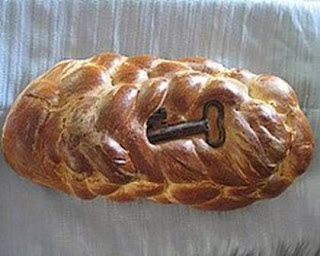| Online: | |
| Visits: | |
| Stories: |
Segula: Magic or Logic?
By Reb Gutman Locks
There is a (mostly) Chassidic custom to bake a key in the challahs[ii] for the first Shabbos night after Pesach. Some households bake the challahs into the shape of a key. It is called a segula for parnosa.[iii]
The Jewish source of this custom is apparently unknown, but there is a known non-Jewish source for the custom.
When I mentioned the key to two non Chassidic rabbis they became border line violent: “We don’t do that!” “Almost outright magic!”
I was surprised by their reaction. It seems since they do not see the logic of this “segula” they consider it some kind of voodoo where we say that we are putting a key in a loaf of bread and this will bring us money. But the custom makes sense.
This Shabbos we move from eating matzah to eating the challahs. When we left Egypt we first ate the matzah that we earned with our slave labor in Egypt. When that ran out Hashem provided us with the man (manna). Our challahs represent the manna.
All we had to do was to bend over and pick it up, and our daily rations were provided. But, if we took more than we needed on any day, that extra portion would rot. The problem came for Shabbos when we were not allowed to go out and pick up the manna. Hashem provided for us by having our Friday’s manna miraculously double. This is why we always have two loaves of challah on Shabbos.
Now we see why the double challahs are the key to our parnosa. If we today, will rely on Hashem as we did when He took us out of Egypt, then He will provide us with all of our needs.
The custom is not magic, not at all. It is a reminder that we should place our trust fully on Hashem, follow His commandments, and this will guarantee us a comfortable livelihood. Logic, not magic.
[i] The word segula in Hebrew means a precious thing, a virtue hidden in someone, or a means to achieve something.
[ii] braided loaves of Shabbos bread
[iii] livelihood
* Shop / Connect / Enjoy the Earth’s Biggest Selection. *
Source: http://www.mpaths.com/2014/04/segula-magic-or-logic.html





